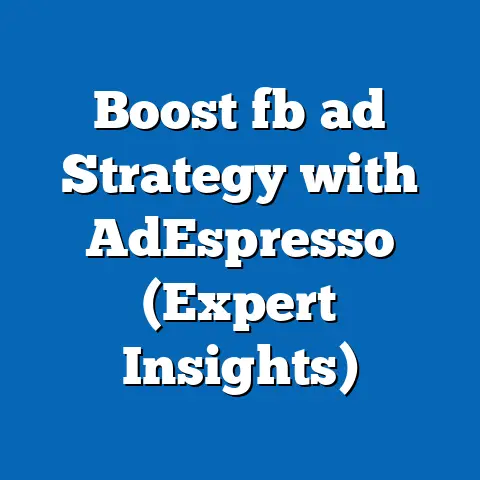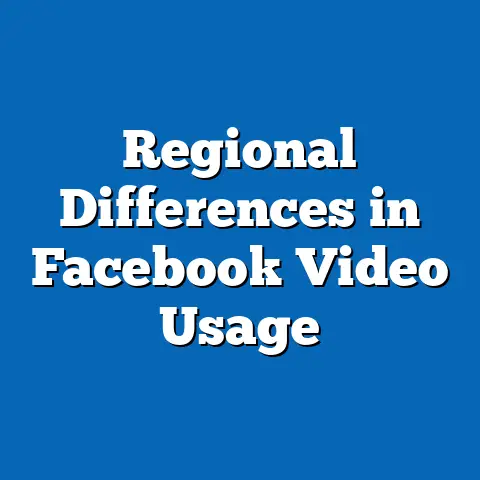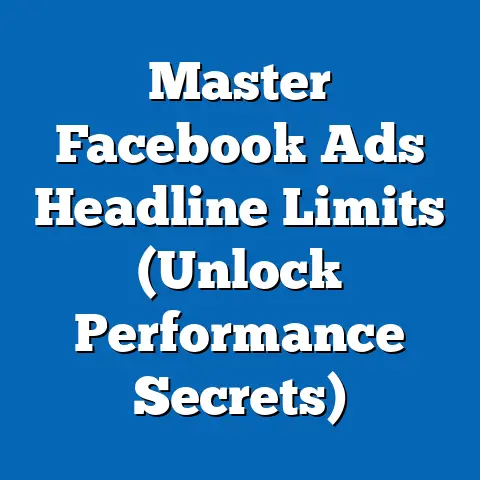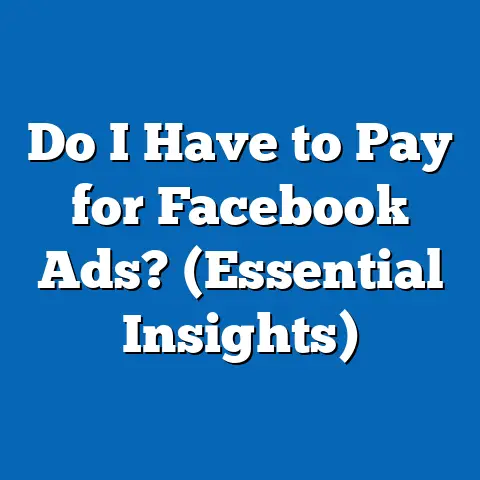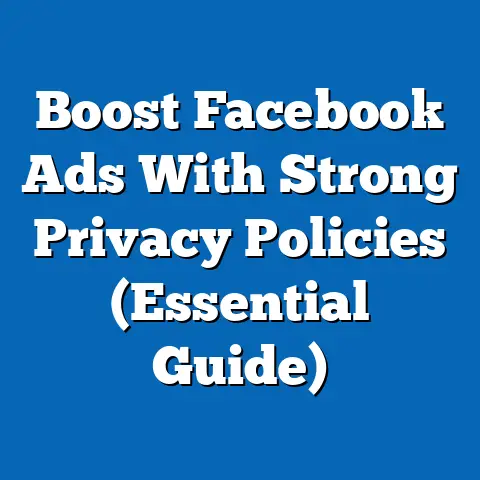Unleash AI for Facebook Ads Success (Game-Changer Insights)
Advertising has always been about connecting with people, but the way we do that is constantly evolving.
I remember when billboards were the pinnacle of reach, then came television, and now, the digital landscape reigns supreme.
Within that landscape, Facebook Ads has become a powerhouse for businesses of all sizes.
However, simply throwing ads onto Facebook isn’t enough anymore.
To truly succeed, we need to adapt, innovate, and embrace the latest technologies.
That’s where Artificial Intelligence (AI) comes in.
In this article, I’ll delve into the world of AI-powered Facebook Ads, exploring how it’s transforming the way we target audiences, create compelling content, and measure campaign performance.
Get ready to discover game-changing insights that can help you unlock the full potential of your Facebook advertising efforts.
Understanding AI in Advertising
Artificial Intelligence (AI) isn’t just a buzzword; it’s a powerful force reshaping industries across the board, and advertising is no exception.
Essentially, AI refers to the ability of machines to mimic human intelligence – to learn, reason, and solve problems.
In advertising, this translates to machines analyzing vast amounts of data to identify patterns, predict outcomes, and automate tasks that would otherwise require significant human effort.
I remember early on in my career, manually analyzing campaign data in spreadsheets – a tedious and time-consuming process.
Now, AI can do that in a fraction of the time, providing insights that I might have missed.
AI technology has deeply penetrated the advertising sector, impacting everything from data analytics and audience targeting to content creation and campaign optimization.
We see it in:
- Data Analytics: AI algorithms can process massive datasets from Facebook and other sources to understand user behavior, preferences, and demographics.
- Audience Targeting: AI helps identify the most relevant audiences for your ads, ensuring that your message reaches the people most likely to convert.
- Optimization: AI continuously monitors campaign performance and makes adjustments in real-time to maximize results.
The benefits of AI in enhancing the efficiency and effectiveness of ad campaigns are undeniable.
By automating tasks, providing deeper insights, and improving targeting, AI can significantly boost your ROI.
According to a report by McKinsey, companies that actively use AI in marketing and sales can see a 15-20% increase in marketing efficiency and a 10-15% increase in revenue.
Takeaway: AI in advertising is about leveraging machine intelligence to make smarter, data-driven decisions that improve campaign performance and ROI.
It’s about moving beyond guesswork and embracing a more scientific approach to advertising.
The Mechanics of Facebook Ads
Before diving deeper into how AI enhances Facebook Ads, it’s crucial to have a solid understanding of the platform itself.
Facebook Ads offers a wide range of ad formats, each designed to achieve specific marketing goals.
These include:
- Image Ads: Simple, visually appealing ads that showcase your product or service.
- Video Ads: Engaging ads that capture attention and tell a story.
- Carousel Ads: Ads that allow you to display multiple images or videos in a scrollable format.
- Collection Ads: Ads that showcase a selection of products from your catalog.
- Lead Ads: Ads designed to collect leads directly within the Facebook platform.
Facebook’s algorithm plays a vital role in determining which ads are shown to which users.
It considers factors such as:
- Bid: How much you’re willing to pay for each ad placement.
- Relevance: How relevant your ad is to the user’s interests and behavior.
- Quality: The overall quality of your ad, including its visual appeal and messaging.
Audience segmentation is key to effective Facebook advertising.
By dividing your target audience into smaller, more specific groups based on demographics, interests, and behaviors, you can tailor your ads to resonate with each segment.
Facebook’s Ad Manager is your central hub for creating, managing, and analyzing your ad campaigns.
It provides a wealth of tools and features, including:
- Campaign Creation: Easily set up new campaigns, define your target audience, and choose your ad placements.
- Budget Management: Set daily or lifetime budgets for your campaigns.
- Performance Tracking: Monitor key metrics such as reach, impressions, clicks, and conversions.
When I first started using Facebook Ads Manager, I was overwhelmed by the sheer amount of options.
But with practice and a focus on understanding the fundamentals, it became an invaluable tool for driving results.
Takeaway: Understanding the mechanics of Facebook Ads, including ad formats, the algorithm, audience segmentation, and the Ad Manager, is essential for leveraging AI effectively.
It provides the foundation upon which you can build your AI-powered strategies.
AI-Powered Targeting and Personalization
One of the most significant ways AI is transforming Facebook Ads is through hyper-targeting and personalization.
Gone are the days of generic ads that appeal to everyone.
Today, AI allows us to deliver highly tailored messages to specific individuals based on their unique interests, behaviors, and preferences.
AI tools analyze vast amounts of user data, including:
- Demographics: Age, gender, location, education, etc.
- Interests: Pages liked, groups joined, topics followed.
- Behaviors: Purchases made, websites visited, apps used.
By identifying patterns and correlations in this data, AI can create highly accurate user profiles and predict their likelihood of engaging with your ads.
Some examples of AI technologies that aid in audience segmentation and targeting include:
- Lookalike Audiences: Create audiences that resemble your existing customers or website visitors.
I’ve found this to be incredibly effective for expanding my reach and finding new customers who are likely to be interested in my products. - Custom Audiences: Upload your own customer data, such as email lists or phone numbers, to target specific individuals on Facebook.
- AI-Powered Interest Targeting: Facebook’s AI algorithm can automatically identify relevant interests for your target audience based on their behavior and preferences.
Personalized ad experiences are crucial for capturing attention and driving conversions.
AI can help you create tailored content that resonates with individual users by:
- Dynamic Content: Automatically adjusting ad copy, images, and calls-to-action based on user demographics, interests, and behaviors.
- Personalized Product Recommendations: Showcasing products that are most relevant to each user based on their browsing history and purchase patterns.
- Behavioral Retargeting: Showing ads to users who have previously interacted with your website or app, reminding them of your products or services.
I once ran a campaign for an e-commerce client that sold personalized gifts.
By using AI to dynamically adjust the ad copy and images based on the user’s interests (e.g., showing ads for personalized mugs to users who liked coffee-related pages), we saw a 30% increase in conversion rates.
Takeaway: AI-powered targeting and personalization are essential for delivering relevant and engaging ad experiences that resonate with individual users.
By leveraging AI tools, you can reach the right people with the right message at the right time, maximizing your chances of success.
Creative Optimization through AI
AI isn’t just about targeting; it’s also revolutionizing the way we create ad content.
Gone are the days of relying solely on intuition and guesswork.
Today, AI can analyze which visuals, copy, and formats perform best, helping you create ads that are more likely to capture attention and drive conversions.
AI can assist in the creation of ad content by:
- Analyzing Visual Performance: Identifying which images and videos are most engaging based on factors such as color palettes, composition, and facial expressions.
- Optimizing Ad Copy: Suggesting headlines, descriptions, and calls-to-action that are more likely to resonate with your target audience.
- Recommending Ad Formats: Determining which ad formats (e.g., image, video, carousel) are most effective for your specific marketing goals.
Machine learning plays a crucial role in testing different ad variations and optimizing campaigns based on real-time data.
By running A/B tests and analyzing the results, AI can identify the winning combinations of visuals, copy, and formats, allowing you to continuously improve your ad performance.
I’ve seen firsthand how AI can transform creative optimization.
In one campaign, we used an AI-powered tool to test hundreds of different ad variations.
The tool identified a combination of headline, image, and call-to-action that I never would have thought of on my own, and it ended up increasing our click-through rate by 40%.
Here’s a case study that highlights a brand that successfully used AI-driven creative optimization:
- Sephora: The beauty retailer used AI to analyze customer data and create personalized ad experiences.
By tailoring ad copy, images, and product recommendations to individual users, Sephora saw a significant increase in engagement and sales.
Takeaway: AI-driven creative optimization allows you to move beyond guesswork and make data-driven decisions about your ad content.
By leveraging AI tools, you can create ads that are more engaging, relevant, and effective, leading to improved campaign performance.
Predictive Analytics and Performance Measurement
Predictive analytics is the crystal ball of advertising.
It allows you to forecast ad performance and consumer behavior based on historical data and trends.
AI can analyze vast amounts of data to identify patterns and predict which campaigns are likely to succeed.
AI can provide insights into:
- Campaign Performance: Predicting which campaigns are most likely to achieve your desired goals, such as increased website traffic, lead generation, or sales.
- Consumer Behavior: Forecasting how consumers will respond to your ads, including their likelihood of clicking, engaging, and converting.
- Market Trends: Identifying emerging trends and opportunities that you can capitalize on.
I’ve used predictive analytics to identify potential issues with my campaigns before they even arose.
For example, I once used AI to predict that my ad spend was going to exceed my budget for the week.
By adjusting my bids and targeting, I was able to stay within budget and avoid overspending.
When measuring the success of your Facebook Ads campaigns, it’s crucial to focus on the right metrics and KPIs.
Some key metrics to track include:
- Reach: The number of unique users who saw your ads.
- Impressions: The number of times your ads were displayed.
- Click-Through Rate (CTR): The percentage of users who clicked on your ads.
- Conversion Rate: The percentage of users who completed a desired action, such as making a purchase or filling out a form.
- Cost Per Acquisition (CPA): The cost of acquiring a new customer through your ad campaigns.
- Return on Ad Spend (ROAS): The amount of revenue generated for every dollar spent on advertising.
By tracking these metrics and using AI to analyze the data, you can gain valuable insights into your campaign performance and identify areas for improvement.
Takeaway: Predictive analytics and performance measurement are essential for optimizing your Facebook Ads campaigns and maximizing your ROI.
By leveraging AI to forecast ad performance and track key metrics, you can make data-driven decisions that drive results.
Challenges and Ethical Considerations
While AI offers tremendous potential for enhancing Facebook Ads, it’s important to be aware of the challenges and ethical considerations involved.
One of the biggest challenges is data privacy.
AI algorithms rely on vast amounts of user data, and it’s crucial to ensure that this data is collected and used in a responsible and ethical manner.
Marketers must be transparent about how they are using data and obtain consent from users before collecting their information.
Another challenge is the potential for bias in AI algorithms.
If the data used to train the algorithm is biased, the algorithm may perpetuate and even amplify those biases.
This can lead to discriminatory outcomes, such as showing certain ads only to certain demographics.
I’ve seen firsthand how algorithms can perpetuate biases.
In one campaign, we used an AI-powered tool to target ads to users who were likely to be interested in a particular product.
However, the algorithm ended up targeting the ads primarily to men, even though the product was equally appealing to women.
We had to manually adjust the targeting to ensure that the ads were reaching a diverse audience.
It’s also important to strike a balance between automation and human creativity.
While AI can automate many tasks, it’s still important to have human oversight to ensure that the ads are creative, engaging, and relevant to the target audience.
Finally, marketers must be transparent and accountable for the decisions made by AI algorithms.
If an ad campaign produces unintended consequences, it’s important to understand why and take steps to prevent it from happening again.
Takeaway: While AI offers tremendous potential for enhancing Facebook Ads, it’s important to be aware of the challenges and ethical considerations involved.
By addressing these challenges and adhering to ethical principles, marketers can ensure that they are using AI in a responsible and beneficial way.
Future Trends in AI and Facebook Ads
The future of AI and Facebook Ads is bright, with exciting advancements on the horizon.
One emerging trend is the use of voice search.
As voice assistants like Siri and Alexa become more prevalent, marketers will need to optimize their ads for voice search.
This means using natural language and focusing on long-tail keywords that people are likely to use when speaking.
Another trend is augmented reality (AR).
AR allows users to overlay digital content onto the real world, creating immersive and engaging experiences.
Facebook is already experimenting with AR ads, allowing users to virtually try on products or see how furniture would look in their homes.
I believe that AR has the potential to revolutionize the way we advertise on Facebook.
Imagine being able to try on a pair of sunglasses virtually before buying them, or seeing how a new sofa would look in your living room.
This would make the shopping experience much more engaging and convenient.
It’s also important to stay ahead of the curve by continuously adapting to technological changes.
AI is evolving rapidly, and marketers need to stay informed about the latest advancements in order to remain competitive.
Takeaway: The future of AI and Facebook Ads is full of exciting possibilities.
By staying informed about emerging trends and adapting to technological changes, marketers can position themselves for success in the ever-evolving world of digital advertising.
Conclusion: Preparing for Success
In this article, I’ve explored the transformative power of AI in Facebook Ads.
From hyper-targeting and personalized content to predictive analytics and creative optimization, AI is revolutionizing the way we advertise on Facebook.
I’ve shared insights into:
- Understanding the role of AI in advertising.
- Mastering the mechanics of Facebook Ads.
- Leveraging AI for targeting and personalization.
- Optimizing creative content with AI.
- Using predictive analytics for performance measurement.
- Addressing the challenges and ethical considerations of AI.
- Exploring future trends in AI and Facebook Ads.
Embracing AI in Facebook Ads is not just a trend; it’s a necessary evolution for marketers seeking success.
By exploring AI tools and strategies, you can enhance your Facebook Ads, drive business growth, and stay ahead of the competition.
I encourage you to start experimenting with AI tools and strategies in your own Facebook Ads campaigns.
The sooner you embrace AI, the sooner you’ll start seeing the benefits.
Don’t be afraid to experiment, learn from your mistakes, and continuously improve your approach.
The future of Facebook advertising is AI-powered, and those who embrace it will be the ones who thrive.

